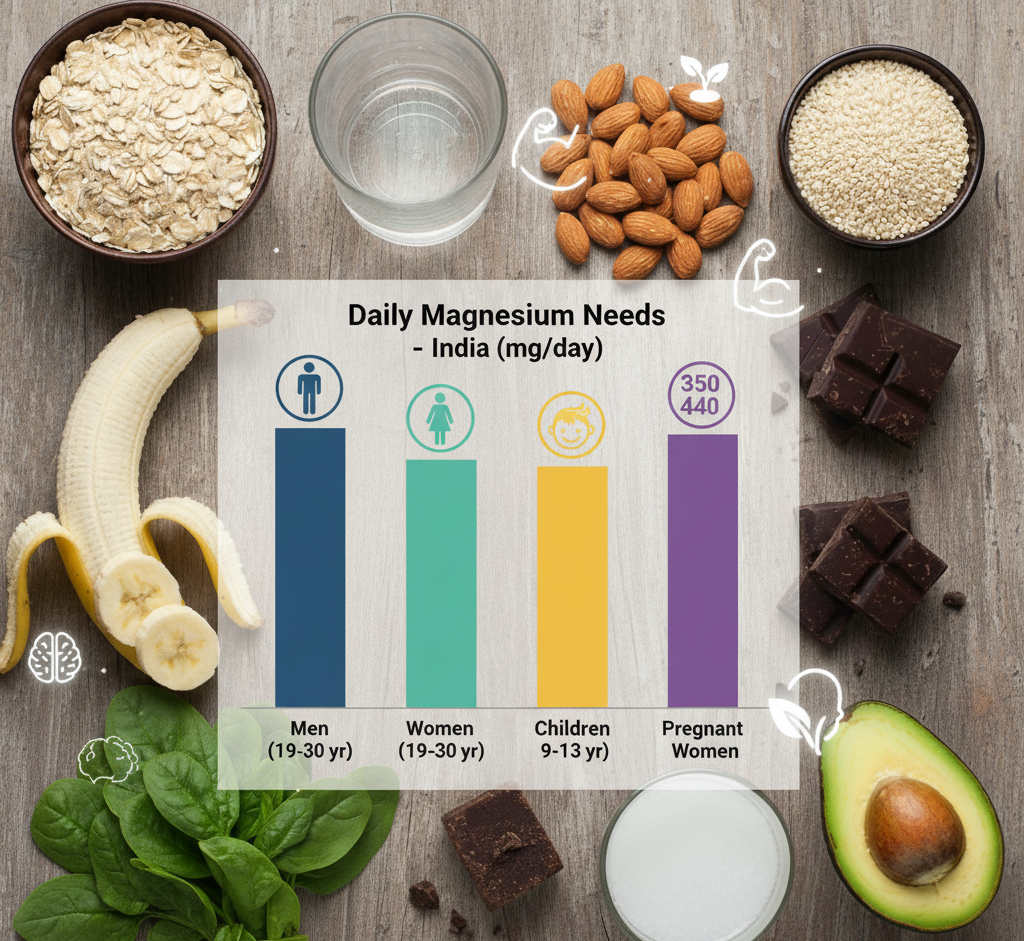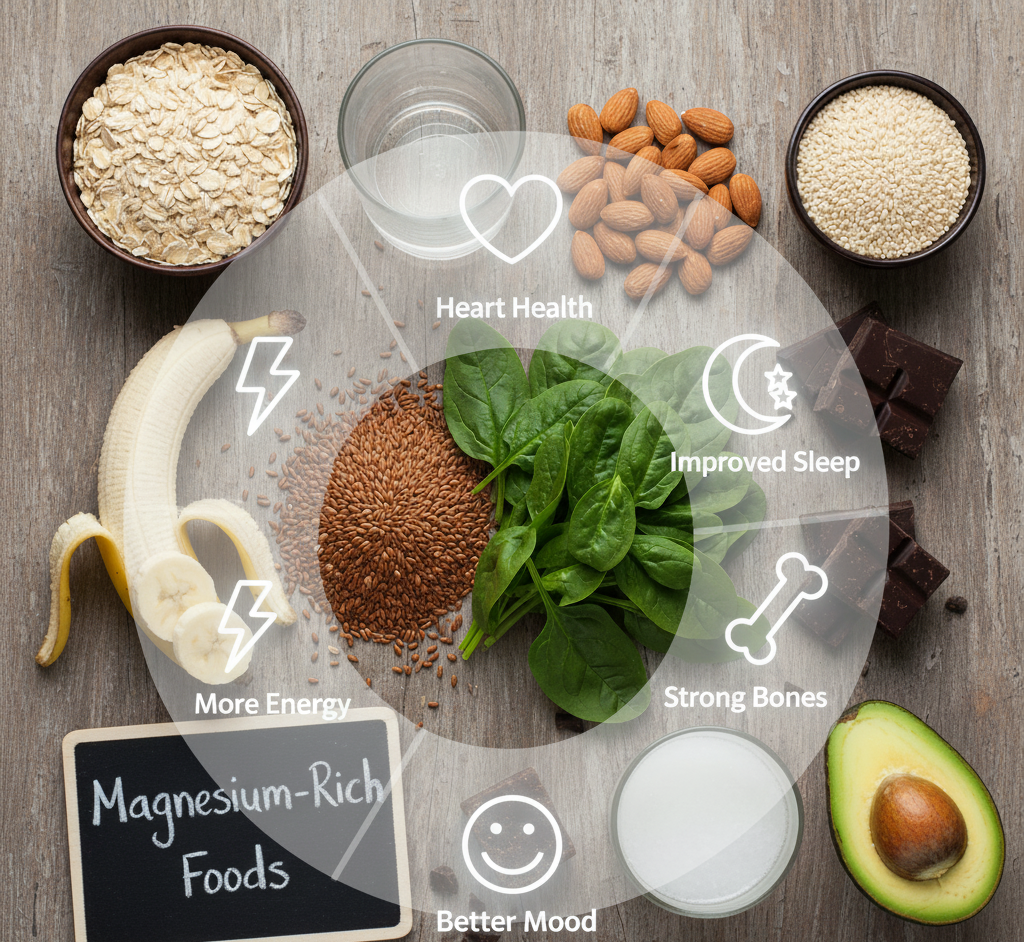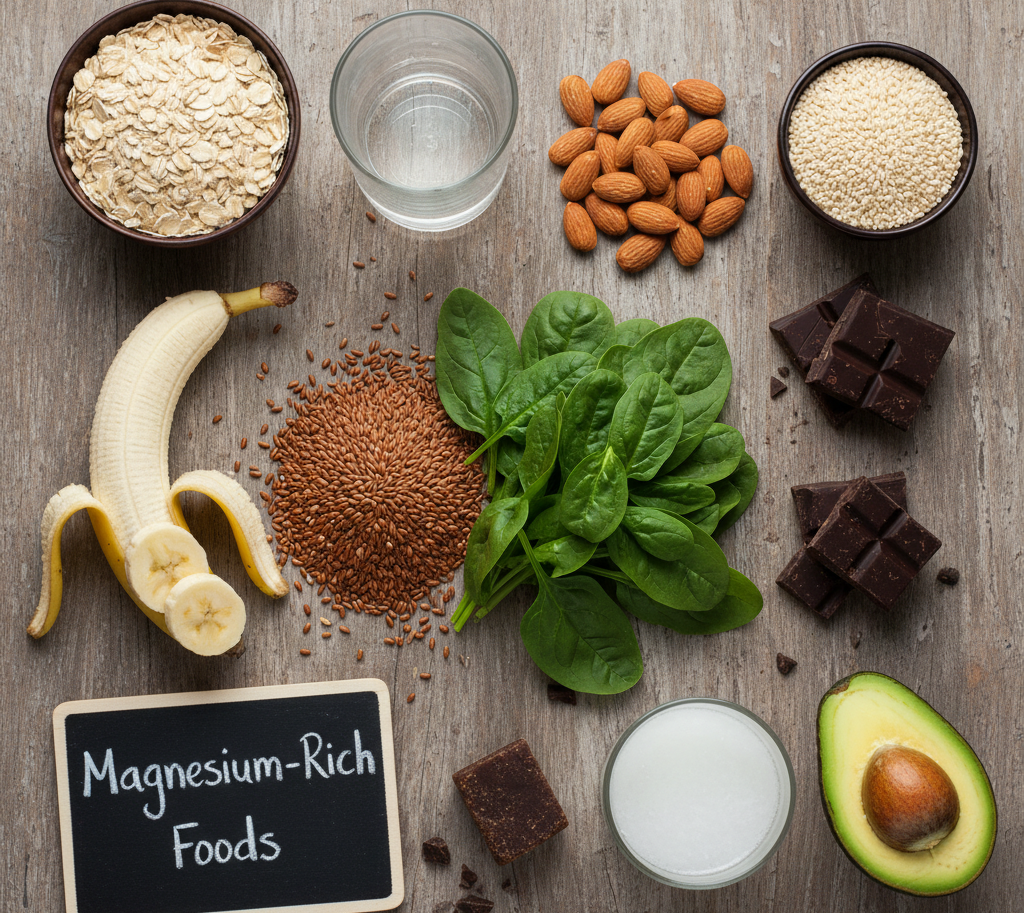Introduction
Magnesium may not get the same attention as calcium or iron, but it’s just as essential for your body’s health. This mighty mineral helps your heart beat steadily, your muscles relax properly, and your brain function smoothly.
Yet, research shows that more than 70% of Indian adults don’t get enough magnesium daily—mainly due to refined diets, stress, and processed foods. The good news? You don’t need expensive supplements. Many Indian staples like spinach, banana, sesame, and jaggery are rich in magnesium and can help restore your body’s balance naturally.
Let’s explore what magnesium does, how much you need, and the 10 surprising natural sources you probably never knew about!
What Is Magnesium and Why Does Your Body Need It?
Magnesium is a vital mineral that supports over 300 enzymatic reactions in your body. It helps regulate:
- Muscle and nerve function
- Blood pressure and sugar control
- Bone formation and calcium absorption
- Energy production and metabolism
- Mood and sleep patterns
Without enough magnesium, your body struggles to function efficiently. Over time, deficiency can lead to muscle cramps, anxiety, irregular heartbeat, and even hypertension.
Recommended Daily Magnesium Intake (India Guidelines)

|
Age Group |
Recommended Daily Allowance (RDA) |
|
Adult Men |
340–400 mg/day |
|
Adult Women |
310–320 mg/day |
|
Pregnant Women |
350–360 mg/day |
|
Children (4–8 years) |
130 mg/day |
|
Teenagers (14–18 years) |
360–410 mg/day |
Top 10 Surprising Natural Sources of Magnesium in the Indian Diet
1. Ragi (Finger Millet)
A true Indian superfood, ragi is a powerhouse of magnesium.
- 100 g provides ~130 mg magnesium
- Supports bone health, reduces blood sugar spikes, and boosts energy
- Ideal for diabetics and vegetarians
Pro tip: Have ragi dosa or porridge for breakfast twice a week.
2. Jaggery (Gur)
A natural sweetener loaded with minerals.
- 1 tbsp jaggery contains ~10 mg magnesium
- Helps combat fatigue and supports muscle relaxation
- Great alternative to refined sugar
Note: Consume moderately—jaggery still adds calories.
3. Sesame Seeds (Til)
Just a handful of til seeds can do wonders.
- 1 tbsp = 30–35 mg magnesium
- Strengthens bones and improves hormone balance
- Perfect for post-menopausal women
Add it to: Ladoos, chutneys, or sprinkle on salads.
4. Bananas
A classic, affordable fruit that keeps muscles and nerves healthy.
- 1 medium banana = 32 mg magnesium
- Also rich in potassium and fiber
- Prevents cramps, especially for athletes and pregnant women
Snack idea: Banana with peanut butter for a pre-workout boost.
5. Dark Chocolate (Minimum 70% cocoa)
Yes, chocolate can be healthy!
- 30 g dark chocolate = 65 mg magnesium
- Rich in antioxidants and improves mood
- Supports brain and heart health
Tip: Choose unsweetened or low-sugar versions.
6. Spinach (Palak)
A green hero from every Indian kitchen.
- 1 cup cooked spinach = 157 mg magnesium
- Great for bone density and energy levels
- Also provides iron, calcium, and folate
Have it as: Palak dal, soup, or smoothie.
7. Almonds and Cashews
A crunchy, convenient snack.
- 30 g almonds = 80 mg magnesium
- 30 g cashews = 75 mg magnesium
- Promotes heart health and controls sugar levels
Tip: Soak overnight for better digestion.
8. Avocado
Although not traditional in Indian diets, it’s increasingly popular.
- 1 medium avocado = 58 mg magnesium
- Packed with healthy fats, fiber, and potassium
Budget tip: Replace with ripe banana + ground flaxseed if avocado is costly.
9. Whole Grains (Brown rice, Quinoa, Oats)
Refined grains lose most of their magnesium. Choose whole forms.
- 1 cup cooked brown rice = 86 mg magnesium
- 1 cup oats = 64 mg magnesium
Include in: Breakfast bowls, pulao, or khichdi.
10. Coconut Water
Refreshing, electrolyte-rich, and natural.
- 1 glass = 25 mg magnesium
- Hydrates the body and prevents muscle cramps
Perfect for: Post-workout recovery or hot summer days.
Health Benefits of Magnesium
- Supports Heart Health: Regulates blood pressure and maintains heart rhythm.
- Strengthens Bones: Works with calcium and vitamin D for stronger bones.
- Improves Sleep Quality: Helps produce melatonin and relaxes muscles.
- Boosts Energy: Converts food into usable energy.
- Relieves PMS Symptoms: Reduces bloating and mood swings.
- Prevents Migraines: Lowers the frequency and severity of headaches.
- Balances Blood Sugar: Essential for people with diabetes or PCOD.
ALSO READ: Osteoporosis: 6 Symptoms That Show Up In Hands, Legs, And Teeth You Must Not Ignore
Signs of Magnesium Deficiency
- Frequent muscle cramps or twitches
- Fatigue or low energy
- Irregular heartbeat
- Tingling or numbness
- Poor sleep quality
- Anxiety or irritability
- Headaches or migraines
If you notice several of these, consult a general physician through Quickobook for a magnesium blood test or nutrition advice.
Diagnosis and Treatment
Doctors may recommend:
- Serum magnesium test to confirm deficiency
- Dietary changes emphasizing magnesium-rich foods
- Oral supplements (only under medical advice)
Cost: A magnesium test in India usually costs ₹300–₹600 in diagnostic labs.
Lifestyle and Prevention Tips
✅ Eat fresh, whole foods instead of processed ones.
✅ Reduce alcohol, caffeine, and excess salt (they lower magnesium absorption).
✅ Include nuts, leafy greens, and pulses daily.
✅ Stay hydrated with coconut water or lemon water.
✅ Manage stress through yoga or meditation.
When to See a Doctor
Visit a doctor if you experience:
- Continuous muscle spasms
- Persistent fatigue despite eating well
- Irregular heartbeat
- Numbness or tingling in limbs
Your doctor may recommend magnesium supplements or intravenous therapy depending on severity.
Risks and Complications of Low Magnesium
Untreated deficiency can lead to:
- Hypertension and cardiac issues
- Osteoporosis
- Type 2 diabetes
- Chronic fatigue syndrome
- Mental health disturbances
Conclusion
Magnesium is a silent supporter of your body’s health—working quietly behind the scenes to keep your muscles, nerves, and heart in sync. The best part? You don’t need fancy supplements or imported foods. Most Indian kitchens already have magnesium-rich treasures like ragi, sesame, spinach, and jaggery.
Start small: add one magnesium-rich food daily, and your body will thank you with better sleep, more energy, and a calmer mind.

Quickobook CTA
???? Looking for personalized advice on nutrition or magnesium deficiency?
???? Book an appointment with a certified General Physician or Dietitian on Quickobook today!
✅ Online and in-clinic consultations across India
✅ Verified doctors | Transparent fees | 24×7 availability
Book Now on Quickobook →
50 FAQs on Magnesium (Short & Clear)
Q1. What is magnesium?
A mineral essential for energy, muscle, and nerve function.
Q2. How much magnesium do adults need daily?
Around 310–400 mg, depending on gender.
Q3. What happens if magnesium is low?
You may feel tired, have cramps, or irregular heartbeat.
Q4. Can I get magnesium naturally?
Yes, through ragi, spinach, nuts, and jaggery.
Q5. Does stress lower magnesium?
Yes, chronic stress increases magnesium loss.
Q6. Is magnesium good for the heart?
Absolutely—it helps regulate heartbeat and blood pressure.
Q7. Are bananas a good source?
Yes, one banana provides around 32 mg magnesium.
Q8. Does boiling vegetables reduce magnesium?
Yes, steaming retains more nutrients than boiling.
Q9. Can magnesium help anxiety?
It supports brain health and may reduce mild anxiety.
Q10. What are magnesium-rich Indian foods?
Ragi, sesame seeds, spinach, banana, jaggery, and almonds.
Q11. Is coconut water rich in magnesium?
Yes, it’s a natural electrolyte drink.
Q12. Can magnesium improve sleep?
Yes, it helps relax muscles and promote melatonin.
Q13. Is magnesium safe in pregnancy?
Yes, but consult your doctor for the right dose.
Q14. What’s the best time to take magnesium supplements?
Evening, as it may aid relaxation and sleep.
Q15. Can too much magnesium be harmful?
Yes, excess may cause diarrhea or low blood pressure.
Q16. Can magnesium help with migraines?
Yes, regular intake can reduce headache frequency.
Q17. Do children need magnesium too?
Yes, it’s vital for growth and bone health.
Q18. Can magnesium help diabetics?
It improves insulin sensitivity and sugar control.
Q19. Is jaggery a magnesium source?
Yes, a tablespoon gives around 10 mg.
Q20. Can I take magnesium daily?
Yes, within recommended limits.
Q21. Does coffee affect magnesium?
Excess caffeine can reduce absorption.
Q22. Can magnesium reduce muscle cramps?
Yes, it relaxes muscles and improves circulation.
Q23. Is magnesium good for bones?
Yes, it works with calcium and vitamin D.
Q24. Does cooking affect magnesium in food?
Overcooking may reduce its content.
Q25. Can magnesium help PCOS?
It may help regulate insulin and mood.
Q26. Which fruit has the most magnesium?
Banana and avocado are great sources.
Q27. How do I know if I’m low in magnesium?
Blood tests or signs like cramps and fatigue.
Q28. Can magnesium help during menstruation?
Yes, it eases cramps and mood swings.
Q29. Is ragi better than rice for magnesium?
Yes, ragi has higher mineral content.
Q30. Does magnesium affect mood?
Yes, it supports serotonin production.
Q31. Can vegetarians get enough magnesium?
Yes, through nuts, pulses, and leafy greens.
Q32. Can magnesium lower blood pressure?
It may help in mild hypertension.
Q33. What’s a quick magnesium-rich snack?
Handful of almonds or banana smoothie.
Q34. Can magnesium help with constipation?
Yes, it softens stools and improves digestion.
Q35. Does magnesium help athletes?
Yes, prevents cramps and enhances recovery.
Q36. Is milk high in magnesium?
Contains small amounts; combine with other foods.
Q37. Can magnesium cause sleepiness?
It promotes relaxation, not drowsiness.
Q38. What time of day should I eat magnesium-rich food?
Anytime; evening meals aid sleep.
Q39. Can low magnesium cause anxiety?
Yes, deficiency affects brain chemistry.
Q40. Is magnesium found in lentils?
Yes, especially in moong and masoor dal.
Q41. Does dehydration affect magnesium?
Yes, excessive sweating or diarrhea can deplete it.
Q42. Is spinach high in magnesium?
Yes, 1 cup gives over 150 mg.
Q43. Is it safe to take magnesium with calcium?
Yes, they work together for bone health.
Q44. Can magnesium improve focus?
It supports nerve communication and reduces fatigue.
Q45. Can I take magnesium without a doctor’s advice?
Not recommended—get your levels checked first.
Q46. Does magnesium deficiency affect sleep?
Yes, it can cause insomnia or restlessness.
Q47. Can magnesium help with weight loss?
It boosts metabolism indirectly, but not a fat burner.
Q48. Is dark chocolate really healthy?
Yes, in small portions with 70%+ cocoa.
Q49. How can I naturally boost magnesium daily?
Eat nuts, greens, ragi, and drink coconut water.
Q50. Where can I get a magnesium test in India?
At any diagnostic center or through Quickobook partner labs.









Comments (0)
No comments yet. Be the first to share your thoughts!
Leave a Comment